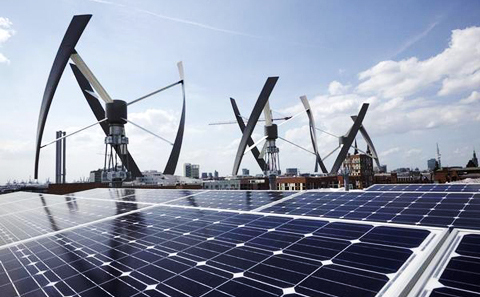Renewables can depress wholesale prices, eg, when the sun creates a midday jolt. This discourages investors in the flexible, gas-powered generation needed to provide backup for windless, cloudy days. “The market dynamics are completely destroyed,” says Peter Terium, boss of RWE, one of the big four. There is talk of paying generators to offer capacity, not supply power. But such payments would add another subsidy distortion to the market.
可再生能源会压低批发电价,比如在正午太阳当头时。这也从灵活性上令投资者犹豫不决,因为天然气发电器需要在无风的阴天里提供后备支援。“市场动态完全被破坏了”,四大电力公司之一的RWE老总Peter Terium说。也有人讨论,电力公司有偿提供产能,而非电力。但这样的支付方式会被市场扭曲理解为政府的另一项补贴。

The 20 billion national-grid plan is another macro-project meant to channel micro-level exuberance. It assumes that the biggest need will be to supply northern wind power to southern and western consumers. Yet if so, perhaps renewables should be tempered elsewhere. “We have to synchronise infrastructure and renewables”, by allowing new wind and solar projects only where the grid can take delivery of what they produce, says Stephan Kohler, head of the German Energy Agency. Upgrading the grid, to beyond Germany as well as within it, would reduce waste and the risk of instability.
200亿的国家电网计划是另一项用来调节微观层面繁荣发展的宏观项目。该计划认为,当务之急是将北方的风电输送至南部、西部的消费者家中。倘若如此,其他地区的可再生能源理应有所缓解。我们只能批准那些设立在电网覆盖范围内的新风电、太阳能项目,“我们不得不以此来协调基础设施同可再生能源的关系”,德国能源机构主席Stephan Kohler表示。升级德国境内外的电网将会减少资金浪费,降低不稳定的危险。
But the vision is contested. Expansion of the grid has been thwarted by bureaucrats’ inertia, politicians’ foot dragging and activism by those who hate transmission masts as much as they do nuclear power. Even upgrades to existing lines can mobilise opposition, as in Quickborn, south of Niebull. Hard-core decentralists deny that power must be transmitted over long distances. “You can put the grid development plan directly in the bin,” says Matthias Willenbacher of Juwi, a big builder of solar and wind projects. Bavaria’s aspirations encourage such hopes. When the federal government tried to speed up cuts in the feed-in tariff for solar power, several states put up a fight, forcing a partial retreat. The renewables lobby, like the industrial one, demands stable investment conditions. Solar power will be competitive without subsidies by 2020, the solar lobby insists.
但这种想法颇具争议。对于扩张电网,懒惰的官员阻扰之,政客们拒绝合作,激进主义者们厌恶核能,却也同样憎恨输电杆。即便是升级现有电路也会引起抗议,就如南尼必尔的quickborm发生的那样。顽固不化的分散主义者对电力必须长途传输的说法予以否认。大型太阳能、风能项目建造商Juwi的Matthias Willenbacher 说,“你可以直接把电网发展计划扔垃圾箱里”。巴伐利亚州“自给自足”的愿望鼓励了这种希望。当联邦政府试图加速降低太阳能发电的强制入网价格时,一些州挺身而出反抗之,最终迫使政府作出部分退让。和工业游说团一样,可再生能源游说团需要稳定的投资环境。太阳能游说团坚称,截至2020年底,即便是没有政府补贴,太阳能发电也会颇具竞争力。
Germany is groping for a mix of top-down direction-setting and bottom-up buy-in for its Energiewende to work. The federal government may limit foes of transmission projects to one court challenge. But consultation with citizens is vital, reckons Mr Matthiessen. TenneT, which operates the grid in Schleswig-Holstein, wants to extend the wind park idea to the transmission network, offering stakes in a line along the west coast. But Mr Bockholt, Niebull’s mayor, sounds a warning: Schleswig-Holstein’s plans to harvest its wealth of wind will soon “reach the limits of what is tolerable”.
为保证能源转型能起作用,德国正在探索一条自上而下发布号令与自下而上逐级买进的混合路子。联邦政府有权向法庭对转换项目的妨碍者提出异议。但Matthiessen先生认为,同市民商量才是最重要的。运行席勒斯威格-霍尔斯坦州电网的TenneT公司,想将风力电场的理念延伸为电力传输系统,就在向市民出手西海岸沿岸一条电路线的股权。但是尼必尔市市长Bockholt先生对此发出警告:席勒斯威格-霍尔斯州的丰富电力收获计划将很快“达到可承受的极限。”
It is hard to think of a messier and more wasteful way of shifting from fossil and nuclear fuel to renewable energy than the one Germany has blundered into. The price will be high, the risks are large and some effects will be the opposite of what was intended. Greenhouse-gas emissions are likely to be higher than they would have been for quite a while to come. But that does not mean the entire enterprise will fail. Politicians cannot reinvent the Energiewende on the run, but they can stay a step ahead of the risks and push back against the costs—and they are beginning to do so. In the end Germany itself is likely to be transformed.
在将矿物燃料、核燃料向可再生能源转换上,德国已经误打误撞的走出了自己的路子,很难再想出一个比德国的更棘手、更耗资的方式。转型价格将高居不下,转型风险巨大、而有些地方也可能事与愿违。在未来很长一段时间内,温室气体排放量极有可能比预期中要高。但是这并不意味着能源转型这项事业将崩溃瓦解。能源转型计划已付诸实行,政客们虽无力改造,却能像德国人正开始做的那样,预测风险,并压缩开支。最终可能发生转变的或许是德国自身。 翻译:王葭苇













